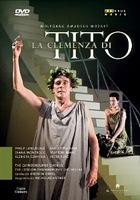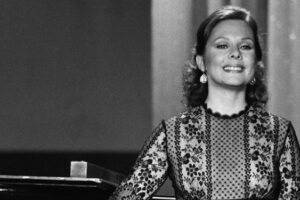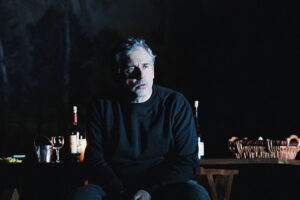
To be, or not to be? This is the question. But for the producers of opera on DVD, the question is really, to be an opera or to be a film. The producers of the 1991 DVD
of Mozart’s La Clemenza di Tito as produced by Glyndebourne that same year seemed to have been sitting on the fence for this decision . Despite strong performances from much of the cast, the experience is mostly unfulfilling due to confusing and almost claustrophobic presentation.
This production, which was highly regarded during its run with Glyndebourne, features the recently late but long time great Philip Langridge as Tito. His plaintive tone would be odd for any other Caeser, but as Tito the sadness and conflict in his tone, supported by his outstanding musicianship and dramatic ability, make for a very human Absolute Ruler. You feel his conflict and pain when he confronts his dear friend Sesto for his attempted murder, yet Mr. Langridge still finds a way to summon some regal fury when he needs it. Combined with his deft use of recitative, he creates a very memorable and endearing Tito.
Ashley Putnam performs a wonderful Vitellia, but with a strikingly different approach than Mr. Langridge. Whether considered or not, Ms. Putnam play to the cameras wonderfully, relying on wonderful yet subtle elements to create a superb characterization of the spurned princess. In the first act, the clarity of her manipulation is presented not by grand gestures, but instead by sexy little looks and coy touching of Sesto. Her eyes tell a fascinating story throughout, especially in her visciously difficult rondo, “Non piu di fiori…” She adroitly handles the frequent excursions well below the staff that Vitellia has to deal with far too often, but her higher register can lose some of the core of her sound that makes the rest of her singing so powerful.
As the sad sack patrician Sesto, Diana Montague ably creates something out of the rather easily manipulated young man. Many a mezzo has failed to showcase the real conflict in this character, love versus, well, everything else, but Ms. Montague really nurtures Sesto’s impossible choice in her singing. Her graceful and beautiful singing, coupled with the long legato phrases that Sesto’s well known arias need and deserve, make for a very satisfying performance.
Martine Mahé’s Annio is sung with a bright and youthful vigor. Ms. Mahé’s exciting tone is perfect for the conflicted Annio, singing with both plaintinve sorrow and loving happiness. Elzbieta Szmytka sings Servillia with a pure and innocent tone, and her ‘S’altro che lagrime’ was handled with ease and proper phrasing. As Publio, Peter Rose is adequate, bringing nothing exceptionally offensive to the production, but is best as the low voice support in ensemble numbers. His solo lines are delivered with a heavy hand and very little focus on the text.
Sir Andrew Davis conducted a vigorous and regal performance. Clemenza is heavy on the brass for a Mozart score, given the royal themes and hailing choruses, and the London Philharmonic beautifully handles the potentially pompous music. Sir Davis’ wry and wily conducting switches from grand royal sounds to anguished music of lost love dripping with pathos easily and organically.
But really, the big problem is the odd videography. The aggressively raked stages, sometimes back to front, sometimes right to left, made for odd camera angles and strange shading. Somehow this created the effect that the stage was small and cramped; far from the royal palaces of Rome or the vast Coliseum.
There was also a pervading feeling of over-production, taking away from the authenticity of the work. Not once is anyone in the orchestra shown, even during the overture. With almost no time between scene changes and no break between acts, the opera seems rushed. You don’t really know how a break between acts can create a sense of closure and give the illusion of passing time until you don’t have one. Why this bothered me so much I don’t know, but aside from Ms. Putnam’s intriguing acting, I almost felt better off just having this released as a CD.
In a note of defense to those that taped this opera, in 1991 DVDs were so new that there are instructions on the package for ‘How to Operate this DVD.’ Maybe they had some grand idea of this new medium as a way to blend opera and film, but in the end their efforts proved counterproductive to both causes.
























Comments